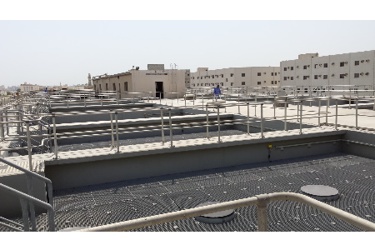Recycling Water For Agriculture In Bahrain

DynaSand filters enable rejuvenation of wastewater treatment plant and supply of irrigation water
Countries in the Middle East face a constant challenge with delivering sufficient water for an increasing population, both for drinking water and irrigation for agriculture. In Bahrain, the largest water treatment works in the country has undergone a huge redevelopment and Nordic Water, a Sulzer brand, has retrofitted the original sand filter basins with DynaSand filters. This, together with a recent expansion of the filtration systems, has enabled the plant to treat 250’000 m3/day for irrigation, the equivalent of 100 Olympic swimming pools every day.
Wastewater treatment plants must meet stringent quality standards for all water discharged back to the environment. This is to protect local flora and fauna as well as the local population. However, as the daily volumes increase, facilities are put under increasing pressure, which means the equipment needs to be upgraded and expanded - often without increasing the footprint of the site.
Repurposing filter basins
In Bahrain, the demand for greater volumes of water for agriculture led to the large-scale refurbishment of one of the largest treatment works in the country. The original sand filters, designed to remove suspended solids, biological materials, microplastics as well as phosphorus, needed replacement. This initial project was contracted to Nordic Water, which had an innovative solution that has significantly increased efficiency and throughput.
With a need to retain the existing footprint of the filters, the project removed the internals of the original equipment and installed 160 DynaSand filters in the original 20 concrete basins. Compared to the legacy system, the new sand filters delivered several advantages, not least the ability to operate continuously without back-washing.
DynaSand filters direct the raw water to the base of the filter and the solids are removed as the water flows up through the media bed. A small part of the filtrate is used for cleaning and the transfer of waste solids. At the same time, an air lift pump draws the media from the bottom of the filter up to the wash box and into the sand washer, where the debris is separated and discharged.
Expanding on success
Having achieved such success, Nordic Water was re-engaged for the expansion project, which is due for completion in the first quarter of 2024. Essentially, the daily volume of water to be treated has doubled since the last project and the filtration equipment needed to handle this increase within the smallest possible footprint.
Considering these requirements, the purpose-built concrete basins were the best solution. Providing a large filter surface area within a small outline, the additional 160 filters have enabled 250’000 m3 of wastewater to be recycled every day by the treatment plant. This simple, but very effective solution has been delivered as part of a coordinated expansion of the original site.
In addition to the sand filtration, there was also a need to tackle a problem with helminth eggs, which pose a significant risk to the local population. The World Health Organization (WHO) has placed a large emphasis on the presence of helminth eggs in wastewater and has deemed these pathogens as the greatest microbiological health risk associated with its reuse. It recommends less than 1 helminth egg / liter as the required standard, which has been surpassed by Nordic Water’s solution.
High-quality solutions
At the time of this WHO report, 1989, the recommended treatment was retention of wastewater in stabilization ponds for 8-10 days. This would clearly create a bottleneck in the process and require a large land area, both of which needed to be avoided in this project.
Nordic Water has addressed this challenge with the addition of nine DynaDisc filters to be used as a pre-filter for the new DynaSand installation. This would remove the helminths, such as hookworm larvae and Ascaris lumbricoides eggs, which pose a particular risk to farm workers who are in contact with wastewater used for irrigation purposes.
Today, the volume of water, equivalent to 100 Olympic-sized swimming pools, that was previously being discharged into the sea every day is being recycled by the treatment plant at such high quality levels that it can all be used for irrigation. The new filtration process is also considerably less expensive to operate than the legacy system. As a result of this large-scale project, the surrounding land has been transformed over the past 13 years and this is set to continue with the most recent facility expansion.
About Sulzer
Sulzer is a global leader in fluid engineering and chemical processing applications. We specialize in energy-efficient pumping, agitation, mixing, separation, purification, crystallization and polymerization technologies for fluids of all types. Our solutions enable carbon emission reductions, development of polymers from biological sources, recycling of plastic waste and textiles, and efficient power storage. Our customers benefit from our commitment to innovation, performance and quality through our responsive network of 180 world-class manufacturing facilities and service centers across the globe. Sulzer has been headquartered in Winterthur, Switzerland, since 1834. In 2022, our 12’900 employees delivered revenues of CHF 3.2 billion.
The Flow Equipment division specializes in pumping solutions specifically engineered for the processes of our customers. We provide pumps, agitators, compressors, grinders, screens and filters developed through intensive research and development in fluid dynamics and advanced materials. We are a market leader in pumping solutions for water, oil and gas, power, chemicals and most industrial segments.
Through a network of over 100 service sites around the world, Sulzer provides cutting-edge parts as well as maintenance and repair solutions for pumps, turbines, compressors, motors and generators. We service our own original equipment, but also all associated third-party rotating equipment run by our customers, maximizing its sustainability and life cycle cost-effectiveness. Our technology-based solutions, fast execution and expertise in complex maintenance projects are available at our customers’ doorsteps. For more information, visit www.sulzer.com
Source: Sulzer
